Brian Clegg's Blog, page 75
April 2, 2015
Bored with the things
 There was a time when large scale institutional practical jokes for April 1 were brilliant because they were so unusual. I'm thinking particularly of the 1957 Panorama mini-documentary on the Swiss peasants going out to reap the spaghetti harvest, and the Guardian's magnificent, very large scale special feature on the floating island of San Serriffe.
There was a time when large scale institutional practical jokes for April 1 were brilliant because they were so unusual. I'm thinking particularly of the 1957 Panorama mini-documentary on the Swiss peasants going out to reap the spaghetti harvest, and the Guardian's magnificent, very large scale special feature on the floating island of San Serriffe.However, on April 1 this year, as has been the case for a while now, I was bombarded with 'really funny' stories like:
The LHC has discovered The ForceJeremy Clarkson is leading a push to get people riding bikesNature piece on real dragonsMirror coffees in Shoreditch (don't ask)The new Orkney legal requirement for all scything to be done with the shirt off (I'm always amazed how many alleged feminists find this kind of sexist drivel appealing)The call for an extra day in April, so we could have British Pi Day (shame on you, Physics World)Ed's Easy Diner's claim to be delivering coffee refills to customers with a drone (see pic)Not to mention transparent Marmite... and basically practically everything that anyone put on Facebook and Twitter on the 1st.
Apart from getting tedious, there is a real danger that people think a genuine story is a joke. My piece about snake oil teas yesterday was not a joke, for instance. So we get confused claims like this that suggest that Amazon's 'dash button' (something you stick on your washing machine, for instance that you press to order more washing powder when you are running low) wasn't a joke... or was it? (Frankly, I'm still not sure about their drone delivery system.)
So, please, could we have a spoof news embargo for the next couple of years? Then, perhaps, we could get back to the naif joy that greeted the spaghetti harvest:
Published on April 02, 2015 02:06
April 1, 2015
Snake oil tea, vicar?
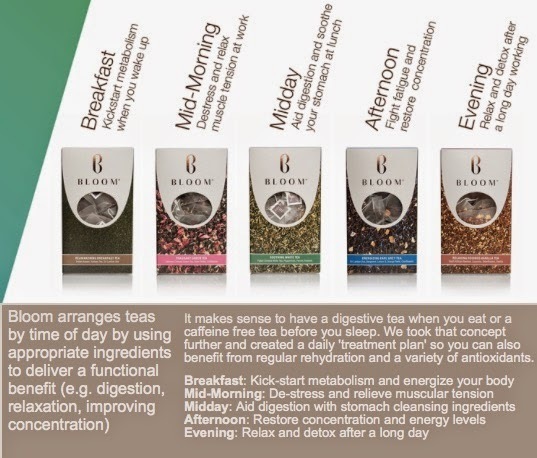 I have recently had brought to my attention the rather impressive way that in a single web page, a product by the name of Bloom teas manages to use three of the great woo-marketing terms.
I have recently had brought to my attention the rather impressive way that in a single web page, a product by the name of Bloom teas manages to use three of the great woo-marketing terms.Now, in the interests of fairness, I ought to point out that I don't drink ordinary tea, but I do enjoy the occasional cup of green tea, of which more in a moment.
So what's so woo-ified? There are three keywords here that raise the dubiousness alarm.
The first is rehydration. While the benefits of this are clear - it's good to keep hydrated - it really doesn't matter what you drink as long as it's mostly water and preferably doesn't contain alcohol. (And you certainly don't need 8 glasses a day - as with all this stuff, see my Science for Life .)So not an out-and-out negative, but something to be a little wary of. Then there the first biggy. Antioxidants. How many times does everyone have to say this? The antioxidants produced by your body are essential. But consuming extra antioxidants has no health benefit and serious supplementation seems to increase the risk of death.
And then, towards the end, there's that favourite of meaningless woo words: detox. There is no such thing as a detox product. Your body has lots of useful organs and processes that remove toxins, but nothing you eat or drink will have an active 'detox' action. It's marketing hogwash, pure and simple.
*ADDED* Thanks to Glenn Patrick for pointing out there's actually a fourth woo claim: that the tea kick-starts your metabolism, as if your metabolism was stopped and needed a starter motor. I could probably add some doubt to 'stomach-clensing ingredients too', while I'm at it. It's so full of... wonder.
You might think this is a matter of hunting butterflies with a bazooka - and to an extent it is. What's more, the reason I drink green tea is that I like the astringent effect that leaves you feeling refreshed and revitalised. But the key word there is 'feeling'. Where a manufacturer strays into snake oil territory is by making what are effectively medical claims by using terms like antioxidant (or just fantasy by talking detox) - after all, they even make it sound medical by calling it a 'treatment plan'. So, I have nothing wrong with 'makes you feel good' type claims, but I can rightly bring out the bazooka when it someone says it 'makes you healthier.'
Published on April 01, 2015 03:03
March 31, 2015
Who to vote for?
 Snapshot of my ward, from www.ukpollingreport.co.ukIt's that time again. A UK general election in around five weeks. And I genuinely don't have a clue who to vote for. Or, rather, I have reasons for voting for three of the candidates and don't know how to assess those reasons.
Snapshot of my ward, from www.ukpollingreport.co.ukIt's that time again. A UK general election in around five weeks. And I genuinely don't have a clue who to vote for. Or, rather, I have reasons for voting for three of the candidates and don't know how to assess those reasons.According to this handy website I have a minimum of five candidates to choose from, who are (in alphabetical order of surname):
Janet Ellard (Liberal Democrats) - my default voting preference is Liberal Democrat (someone has to, and cousin Nick expects it). But there is no chance of the Lib Dems taking our seat. I am very disappointed by the total lack of online data about Ms Ellard. The site I used has not yet got anything like a webpage, Twitter, etc. And the only link they (or Google) do have is to a LibDems page that currently isn't working. No literature through the door or visits. Poor show, guys.James Faulkner (UKIP) - not a chance in hell of getting my vote, I'm afraid. We have email and Twitter. No literature through the door or visits.Justin Tomlinson (Conservative) - I am not a natural Tory voter. However, Mr Tomlinson, the sitting MP, has proved an effective constituency MP, which makes me teeter towards supporting him as an individual, despite significant concerns about his party's policies. He is also a real local, rather than someone dropped in from on high. He didn't reply awfully well to my email about better funding for science. But at least he did respond, very quickly. Every kind of way to contact him, and he has called personally, and put literature through.Mark Dempsey (Labour) - my other voting choice, though the problem here is that I am more New Labour than the current version. My opinion of Mr Milliband has gone up a bit since the TV appearance, and I probably agree with more labour policies than Tory. Mr Dempsey is a local, rather than a parachute in. Good online access. He hasn't called in person, but I had a letter (rather bizarrely addressed to me and one of my daughters).Poppy Hebden-Leeder (Green) - very unlikely to get my vote. I've studied their policies at some length and they are bizarre on defence, spin fantasy on finance and are very poor on science, particularly nuclear power. While I have a natural aversion to anyone with a double barrelled name, Ms Hebden-Leeder is local. Good online connections, though the fact that her Twitter name is @veggiepoppy does her no favours. No literature through the door or visits.So there we have it. UKIP and Greens won't get my vote. My natural choice, the Lib Dems, can't win and so far the candidate is totally anonymous. While I was quite fond of New Labour, the current Labour is veering back to the left a little far for me, which is worrying, and more worrying still, faces the dreaded cold hand of the SNP. While I haven't voted Tory before, the sitting MP seems to have done quite a good job, but can I put constituency effectiveness above party policies and their impact on the country?
I will listen to the TV debate later this week with interest, but I suspect this is the first election in a long time when I will be going to the polls and not know which way I am going to vote until the pencil is poised over the voting slip.
All advice welcome, as long as it is a reasoned argument, not knee-jerk nonsense.
Published on March 31, 2015 01:49
March 30, 2015
The religious fervour of homeopathy fans
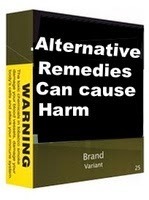 A couple of weeks ago I put up a blog item on Huffington Post, suggesting that it would be a good idea if alternative remedies, like cigarette packets, had to carry a health warning.
A couple of weeks ago I put up a blog item on Huffington Post, suggesting that it would be a good idea if alternative remedies, like cigarette packets, had to carry a health warning.In some cases this was because there were reports of a high percentage of herbal remedies not containing the requisite herb, and sometimes containing fairly dubious contents that could be harmful. And in others, such as homeopathy, it was more because there was a danger of using a homeopathic remedy, and as a result not taking medication that actually does something. So I suggested a suitable warning for a homeopathic product might be something like:
WARNING -- contains no active ingredients. If taken in place of medical treatment could result in harm or deathNow it would be disingenuous of me to suggest that I didn't expect a certain amount of negative response. I was sure it would bring the homeopathy supporters out of the woodwork and it has. I'll go into some of the specific kinds of response in a moment, but the thing I was really quite surprised by (but probably shouldn't have been) was how close some of these responses were to someone defending their religious faith.
I expect, in a contentious area of science, that there will be arguments. So, for instance, if I were to say that I rather hope MOND (modified Newtonian dynamics) can be made to work rather than dark matter as an explanation of the gravitational effects blamed on dark matter (which is true), I could sensibly expect cosmologists/astrophysicists to weigh in with the scientific arguments as to why dark matter is a better bet. But that's not what happened here at all. What I should have been seeing is a) a good explanation for the mechanism of homeopathy (as I claimed there wasn't one) and b) a good collection of large scale, double blinded trials undertaken by experienced professionals that came out in favour of homeopathy being more than a placebo effect. Neither of these things happened.
In practice, the science isn't contentious about homeopathy - it's fairly straight forward. And so, instead, arguments fell into these broad categories:
The report you mention only uses big studies - and this is a bad thing because? Good big studies give more statistically reliable results that good small studies - that's inevitable. If you don't understand this, take a statistics course, please.Making snide remarks - ad hominem attacks are the last resorts of those who have no good arguments. When I see things like 'Thanx [sic] for embarrassing yourself even more' and 'pointing out your egregious ignorance and prejudice in regard to the topic' I know I've hit a raw nerve, because clearly there is a total inability to answer my two key points above.Attack allopathic [sic] medicine - there's a technical term for 'allopathic medicine': it's 'medicine'. However the real point here is that you can't defend something by attacking something else. (E.g. 'Rx drugs are toxic, and RCTs have proven that 50% of the drug trials cannot explain the method of action.') I know the huge amount of good done by modern medicine, and know plenty of people whose lives have been saved or improved by it. But even if every real doctor doing real medicine made all their patients worse, it wouldn't make alternative remedies any better. It's a bit like responding to a restaurant critic who says the food in your restaurant is bad by saying 'Yes, but the food in McDonald's is really bad.' So?It was also fascinating that at least four of the comments were by the same person, someone called Dana Ullman who strangely enough, according to Google is a 'proponent in [sic] the field of homeopathy. Ullman received his MPH from the University of California at Berkeley, and has since taught homeopathy and integrative health care.' So he's not at all biassed, unlike me, as I don't make any money from either alternative remedies or real medicine.
The sad thing is that in all those comments, none of the supporters of homeopathy could address my two key points (or even tried - randomly mentioning the existence of trials without citing them, when meta-studies like the Australian government one have a very clear outcome is not trying). And none seemed to actually realise the point is not that we need a warning that homeopathic remedies (unlike some other alternative therapies) can harm you, but that using them instead of things that work to treat dangerous diseases (there are homeopathic remedies for malaria, for instance, one of the world's biggest killer diseases) really does put people's lives and health at risk.
In the end, as I mentioned above, these weren't logical or scientific arguments I was presented with but rather statements of faith. And that should be a bit embarrassing for those concerned.
Published on March 30, 2015 02:02
March 27, 2015
What's in a (website) name?
 A rose by any other name might smell as sweet (though would you really enthusiastically sniff a 'bumodour' or a 'dogpoo'?) - but websites can have problem if you happen to give a site a name that doesn't really fit with what it sells.
A rose by any other name might smell as sweet (though would you really enthusiastically sniff a 'bumodour' or a 'dogpoo'?) - but websites can have problem if you happen to give a site a name that doesn't really fit with what it sells.Why would anyone do something so stupid? Well, I did. Or, to be more precise, I didn't, but the world has changed around me.
I've always loved church music, particular from the Tudor / Elizabethan period. You'll never find me happier than relaxing to a spot of John Sheppard. So many moons ago, when the web was young and fresh I set up a fan site for this kind of music online. I was approached by some nice people who had recorded some CDs of hymn accompaniments to sing along to - hymn karaoke, if you like - and asked if I could give them a mention. This ended up with me being the online marketing arm of an operation that now has around 93 CDs under its belt, all recorded by a top-notch world-class organist, John Keys.
 Not a church organistBefore long, this had far outgrown my little fan site, so I set up a more professional site for the CDs, imaginatively called www.hymncds.com - and so it continues to the present day, proving remarkably popular, as the world's supply of organists (with the exception of Henry Gee, pictured left, who doesn't do many hymns) is sadly getting on the elderly side.
Not a church organistBefore long, this had far outgrown my little fan site, so I set up a more professional site for the CDs, imaginatively called www.hymncds.com - and so it continues to the present day, proving remarkably popular, as the world's supply of organists (with the exception of Henry Gee, pictured left, who doesn't do many hymns) is sadly getting on the elderly side.But here's the thing. Some time ago, realising that this downloading and streaming was the thing (innit), I added the ability to download the tracks via fine facilities like iTunes and Amazon. You can even stream them for free on Spotify - just search for 'John Keys'. And over time this has become at least 75% of our business. So the site's home page is no longer quite as shown above, as it now proudly says 'ACCOMPANIMENT CDS AND DOWNLOADS' - but it was still www.hymncds.com - to me it seemed a bit strange going to a site called hymncds.com for downloads. The world has moved on from my URL.
Of course one of the joys of the interwebz is that the same site can have more than one address. So from now on, you can also get to it using hymnmp3s.com and hymndownloads.com - because you have to move with the times. Bro.
By the way, if you you wondering 'John Who?', here's a touch of Sheppard to chill out to. Enjoy.
Published on March 27, 2015 03:56
March 26, 2015
Stretching mathematical minds
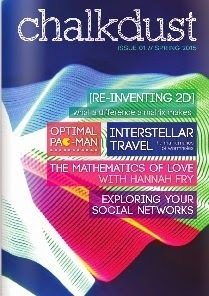 Okay, here's a word association test. What's the first thing that comes to mind when I say... mathematicians? Hands up how many of you said 'Fun'? What, no one?
Okay, here's a word association test. What's the first thing that comes to mind when I say... mathematicians? Hands up how many of you said 'Fun'? What, no one?If you are a mathematician, or a physicist making heavy use of maths, you may feel there's plenty of fun in your world, but just in case you needed a bit more, I can highly recommend UCL's new e-magazine for mathy people, Chalkdust . (Rather an odd choice of title - a bit like a computing magazine calling itself Abacus. But we are dealing with mathematicians.)
What I ought to say straight away is that Chalkdust (my spellchecker insists on converting that to Chalkiest) is not a magazine version of an Ian Stewart type, light and fluffy popular maths book. This is a magazine that doesn't shy away from including the equations of general relativity. But having said that, you don't have to be a genuine, heavy duty mathematician to get something out of it. When I was at university, my maths supervisor gave me some excellent advice, which was 'if the maths doesn't make sense to you yet, just go with the flow, keeping going and it will gradually fit into place.' If you take that kind of viewpoint, looking at the scarier equations, but not worrying too much if you don't understand them, it has something for anyone who has A-level maths or more.
After all, who wouldn't love a mathematical analysis of Pac Man, producing the optimal strategy, or an exploration of the mathematics of wormholes? Okay, quite a lot of people - but I did.
There are parts of the text that feel a touch amateurish, perhaps reflecting that it is produced by students. This was particularly the case with the (very) long interview with Dr Hannah Fry, where the wording sometimes seemed like the work of a 12-year-old, for example:
Boys are like, this maths is hard; whereas the girls are like, I find this maths hard.Hmm. It would also be sensible, if they want some history of maths, to talk to someone who is better informed, as the section on Ada King, Countess of Lovelace had a number of historical inaccuracies, notably:
And if she had [done the 'PR' for Babbage's Analytical Engine], who knows what would have happened. The analytical engine could have been built and then the first computer could have been created a hundred years before it actually was.Well, no, it couldn't have been built, because the analytical engine would have required engineering that was far beyond the capabilities of the time, if it could be constructed at all in mechanical form. It's also an exaggeration (if frequently repeated) to say that King 'wrote the first program' for it. It would be more accurate to say that she translated a paper about the analytical engine written by Luigi Menabrea from French into English, adding a long set of notes in which she described how the machine might be used.
Inevitably a production like this is a trifle hit and miss - but if you take your maths seriously, you could find a surprising amount to interest and entertain you. Sounds worth popping over to straight away. Or at least, after solving* the travelling salesman problem and discovering the best route.
* I know, I know. It was a joke. If you don't know why it's a joke, this might not be the magazine for you.
Published on March 26, 2015 02:06
March 25, 2015
Government Statistic Shock Horror Probe!
Ever happy to expand the horizons of this blog, today we have a guest post from the Daily Excess:
Seventies Student Scroungers Sickie Stats Shock These 1970s students have grown up to be scroungersWhen we think of the 1970s we remember ridiculous clothes, progressive rock and punk, and the Winter of Discontent. (We would like to say something about Princess Diana, but she didn't do much in the 1970s.) What not many realise is that by allowing long-haired types like these to go to university for FREE we brought up a whole generation of scroungers.
These 1970s students have grown up to be scroungersWhen we think of the 1970s we remember ridiculous clothes, progressive rock and punk, and the Winter of Discontent. (We would like to say something about Princess Diana, but she didn't do much in the 1970s.) What not many realise is that by allowing long-haired types like these to go to university for FREE we brought up a whole generation of scroungers.
Statistics show that workers who were students in the 1970s carefully time their sick leave to extend the weekend - nearly half of all sick days are taken on either side of the weekend by these layabouts. This is no doubt so they can attend "music" festivals, or "drop out" and try to recapture their long-lost hippy youth.
A report published by the University of Swindon makes it clear that a whopping 40% of the sick days taken by these rarely-washed individuals are on a Friday or a Monday, giving them a fun long weekend at the expense of taxpayers and business. The Excess says: "It's a disgrace!"
NEXT - SUMMER WILL BE A SCORCHER! 8 WEEKS OF 80 DEGREE MADNESS PREDICTED and RED WINE CAN MAKE YOU STOP EATING CHOCOLATE
___________________________________________
I'm sure you've all spotted the Excess's little error, but just in case you were having a bad day, here is a chart of how the sick days might vary through the week if the Excess's statistics are true:
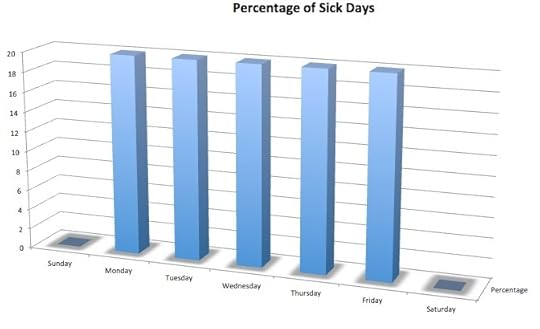
Seventies Student Scroungers Sickie Stats Shock
 These 1970s students have grown up to be scroungersWhen we think of the 1970s we remember ridiculous clothes, progressive rock and punk, and the Winter of Discontent. (We would like to say something about Princess Diana, but she didn't do much in the 1970s.) What not many realise is that by allowing long-haired types like these to go to university for FREE we brought up a whole generation of scroungers.
These 1970s students have grown up to be scroungersWhen we think of the 1970s we remember ridiculous clothes, progressive rock and punk, and the Winter of Discontent. (We would like to say something about Princess Diana, but she didn't do much in the 1970s.) What not many realise is that by allowing long-haired types like these to go to university for FREE we brought up a whole generation of scroungers.Statistics show that workers who were students in the 1970s carefully time their sick leave to extend the weekend - nearly half of all sick days are taken on either side of the weekend by these layabouts. This is no doubt so they can attend "music" festivals, or "drop out" and try to recapture their long-lost hippy youth.
A report published by the University of Swindon makes it clear that a whopping 40% of the sick days taken by these rarely-washed individuals are on a Friday or a Monday, giving them a fun long weekend at the expense of taxpayers and business. The Excess says: "It's a disgrace!"
NEXT - SUMMER WILL BE A SCORCHER! 8 WEEKS OF 80 DEGREE MADNESS PREDICTED and RED WINE CAN MAKE YOU STOP EATING CHOCOLATE
___________________________________________
I'm sure you've all spotted the Excess's little error, but just in case you were having a bad day, here is a chart of how the sick days might vary through the week if the Excess's statistics are true:

Published on March 25, 2015 01:41
March 24, 2015
Something nasty in the woodshed - review of On Parson's Creek
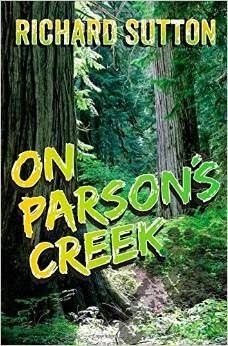 Or more accurately, the title of this review should be 'something nasty in the woods', but I couldn't resist the quote from the incomparable Cold Comfort Farm.
Or more accurately, the title of this review should be 'something nasty in the woods', but I couldn't resist the quote from the incomparable Cold Comfort Farm.I thought I might be a good target for Richard Sutton's On Parson's Creek (no relation to the American soap opera, Dawson's Creek), as I love a touch of the strange, and some of my favourite books are those by, for instance Ray Bradbury, which portray a kind of magical look back at boyhood, although in this case it's more teenhood, with all the uncomfortable difficulties that particular time of life throws up. And I was right.
Sutton does an excellent job of portraying the brooding atmosphere of the dark woods in which the protagonist finds himself, recently moved in with his family and coping with the difficulties of a new school; making new friends at the same time as exploring this uncanny backwoods location. In parts the storytelling oozes atmosphere, particularly in the scenes with the old railroad locomotive.
What starts off as a classic 'young people discover strange things and try to sort it out without involving adults' tale takes some interesting twists as the discoveries get mixed up with Indian legend and the possibility that the woods are home to something like a tribe of Bigfoot.
Although the main character is a teenager, I had no problem getting absorbed by the book. My only real complaint was that Sutton doesn't give us enough. It's quite a short book, and I think he could have expanded the story to give it more drama and a more striking destination. In fact, in a way, the problem is that the storytelling is too realistic. This feels like what a real encounter with Bigfoot might be like, but I wanted more drama, more obstacles to overcome and more twists and turns in the plot.
Since they always say 'Leave them wanting more,' this surely is a relatively small omission on the part of the author. That apart it's a book I really enjoyed.
You can find On Parson's Creek at Amazon.co.uk and Amazon.com.
Published on March 24, 2015 02:18
March 23, 2015
Artful chemistry
 Last Friday I spent a fascinating day at the Royal Society of Chemistry's swish headquarters in Piccadilly (to be precise, in Burlington House, to the right of the Royal Academy). The event was the final of Chemistry World's science communication competition.
Last Friday I spent a fascinating day at the Royal Society of Chemistry's swish headquarters in Piccadilly (to be precise, in Burlington House, to the right of the Royal Academy). The event was the final of Chemistry World's science communication competition.I really didn't know what to expect, but after a rather drawn-out arrival tea and coffee (because the judges couldn't make their minds up in the time available), the day began with short pitches from the 10 finalists who had written an article and now had presented a 'poster session' to the judges on their personal take on the theme of 'art and science.'
 RSC building to right of sculptury thingNow, to be honest, when I heard the topic, my bullsh*t detector went into overdrive. I find the money poured in to projects where artists hang around a science facility than produce some generally forgettable result that is somehow inspired by/linked to/giving extra depth to the work a little nausea-inducing. This is especially the case when sadly, as all too often happens, the suggestion is that the art in some way makes the science more approachable to the public. It doesn't.
RSC building to right of sculptury thingNow, to be honest, when I heard the topic, my bullsh*t detector went into overdrive. I find the money poured in to projects where artists hang around a science facility than produce some generally forgettable result that is somehow inspired by/linked to/giving extra depth to the work a little nausea-inducing. This is especially the case when sadly, as all too often happens, the suggestion is that the art in some way makes the science more approachable to the public. It doesn't.However, to give them their due, most of the finalists had taken a different tack and were either dealing with the impact of science on art (for example, exploring the way that van Gogh's reds have changed over time) or that science was used in the creation of art. And the results were fascinating. What's more, the articles were very readable, especially bearing in mind that most of the participants were graduate students with little or no experience of science communication.
 Who says chemists can't do style
Who says chemists can't do styleProbably the best bit of the day was the lunch. (That makes it sound like a jolly, but it wasn't - you have to be paid for it to be a jolly.) In part this was due to the imagination that the catering team put into the presentation of a lunch served by people in white coats, using lab utensils. The buffet was so visually striking thatfor a little while no one dared approach it.
 Nice! The syringe contains salad dressingAfter a teensy problem of very limited space to eat other that standing up, which would require four hands for knife, fork, plate and glass (I led a rebellion that broke off into the building's reception seating), the best part of lunch turned out to be an opportunity to go around the poster sessions. If you haven't been to an academic conference of late, these started as people standing in front of a poster they had created, talking about their topic (hence the name), though mostly these versions were videos or computer presentations. Not only did you get a chance to find up more about the subjects up close and personal, tasting chocolate and macaroons and sampling delicate perfumes (though it was too close for some on the 'stench of purple' stand, where you had a chance to sniff rotting sea snail odour), but also there was a chance to ask questions of the finalists, who made a great job of it.
Nice! The syringe contains salad dressingAfter a teensy problem of very limited space to eat other that standing up, which would require four hands for knife, fork, plate and glass (I led a rebellion that broke off into the building's reception seating), the best part of lunch turned out to be an opportunity to go around the poster sessions. If you haven't been to an academic conference of late, these started as people standing in front of a poster they had created, talking about their topic (hence the name), though mostly these versions were videos or computer presentations. Not only did you get a chance to find up more about the subjects up close and personal, tasting chocolate and macaroons and sampling delicate perfumes (though it was too close for some on the 'stench of purple' stand, where you had a chance to sniff rotting sea snail odour), but also there was a chance to ask questions of the finalists, who made a great job of it.So to the actual entries. I'm not going to go through all ten here (I had hoped to point you to details of them online, but I can't find them), but I will mention feeling rather sorry for two finalists who weren't there and did their pitch by video, one entirely inaudible while being represented by an incomprehensible silent video in the poster session. They really didn't stand a chance.
 Paul Brack receives his award from the RSC's presidentI must give an honourable mention to one of the runners up, Wei-lun Toh, who, remarkably, is a first year undergraduate. Not only was his slideshow about the whole range of ways that science could be used to determine that Han van Meegeren forged a supposed work by Vermeer fascinating, he added the delightful concept of using a limerick on each slide (some shockingly bad, which added to the appeal) to help reinforce memorability and make the presentation more fun. I would have given him first prize.
Paul Brack receives his award from the RSC's presidentI must give an honourable mention to one of the runners up, Wei-lun Toh, who, remarkably, is a first year undergraduate. Not only was his slideshow about the whole range of ways that science could be used to determine that Han van Meegeren forged a supposed work by Vermeer fascinating, he added the delightful concept of using a limerick on each slide (some shockingly bad, which added to the appeal) to help reinforce memorability and make the presentation more fun. I would have given him first prize.However, I should also say that the winner's story about the use and re-discovery of Egyptian blue, one of the first ever blue pigments, and the first synthetic pigment was fascinating, making Paul Brack a worthy winner. Especially when he said in his pitch that he groaned when he heard the topic, because he wasn't interested in art.
Overall an excellent day - I'm glad I went and I congratulate the RSC (and their sponsor Akzo Nobel) for a great event. I hope some of the participants go on to do more excellent science communication - and here's to next year's shindig!
Published on March 23, 2015 01:58
March 19, 2015
How very different from the school life of our own dear students
 My old school, the Manchester Grammar School is celebrating its 500th anniversary this year with various goings on, including a 'history in 50 objects' series.
My old school, the Manchester Grammar School is celebrating its 500th anniversary this year with various goings on, including a 'history in 50 objects' series.I was struck by a recent entry, on the 'Handbook for Parents' illustrated here, published in 1922. Inevitably, part of the attraction is the period feel of the instructions that the powers-that-be felt should be passed on to the boys. At the time, the school was located in the centre of the city, and it was sternly observed that
Boys are forbidden to smoke, or to enter public billiard rooms, smoking cafes or smoking carriages on the railway. No boy is allowed, without special permission, to enter Victoria or Exchange Stations in the dinner interval.There is also something of a spirit that has perhaps been retained more in our public schools, but thankfully was largely absent from MGS by the time I attended, when parents are informed that
A boy should be trained to get up sufficiently early to allow time for a cold bath…nothing is equally tonic and bracing for the day’s activities, or a better safeguard against catching cold... Frequent indulgence in the theatre or the picture-palace is as harmful and wearing as gardening or carpentry is useful and restful.That was them told.
But the thing I found most fascinating was that at the time the school was divided in an antiquated structure from day one, as soon as a pupil arrived, between the 'classical' and 'modern' sides. The modern side (described as 'the natural resort of the boy who aims for business') covered science and modern languages, while the classical side (you're ahead of me) specialised in the classics and history. But what is particularly interesting is that the classical side was aimed at the 'Higher Civil service' and the learned professions, such as the Church, the Law and Medicine.
So even as recently as the 1920s, less than a century ago, medicine was not really considered as a scientific pursuit. It easy from the outside to equate medicine and science, but there is a distinct tension between the two sometimes. This background as a career that would be best grounded in the classics is perhaps a good indicator of where that tension originated. Things have, of course, changed hugely - but I can't help but confess I sometimes see more of that classicist in some GPs than the viewpoint of a modern scientist.
Published on March 19, 2015 01:54



